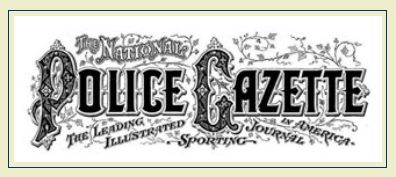In a mere 13 pages, the Board denied a petition for cancellation of a registration for the word-plus-design mark shown below, for "magazines in the field of current events and sports," rejecting pro se Petitioner Steven Westlake's claims of abandonment and fraud. Steven Westlake v. Edgar Alexander Barrera and Richard K. Fox Publishing Company, Cancellation No. 92067884 (June 10, 2020) [not precedential] (Opinion by Judge Frances S. Wolfson).

Abandonment: Petitioner Westlakc claimed that Respondent Barrera abandoned his registration by failing to use the mark in commerce "since at least December 31, 2013." As proof, Westlake submitted the results of an online search conducted on April 14, 2019, which returned a "404 Not Found" page. In response, Barrera introduced three testimonial declarations wherein each declarant stated that the specimens attached to Respondent's Section 8 Declaration of use (January 29, 2016) and to his renewal application (February 3, 2020) for the subject registration were authentic, and that the statement regarding use "were true and accurate." The Board found this evidence adequate to show that Respondent did not abandon the mark.
Fraud: Westlake asserted that Barrera committed fraud by submitting digital renderings as his specimens of use and then falsely claimed that the mark was in use. Barrera did not address the specimen issue directly, but instead pointed to the testimony declarations regarding use.
The Board, noting that fraud must be proven "to the hilt," found that Westlake failed to provide clear and convincing evidence to prove his claim. Even if the specimens of use submitted with the underlying application were improper, that does not prove that the mark was not in actual use at the filing date. Moreover, there was no proof of an intent to deceive the USPTO.
Conclusion: The Board denied the petition for cancellation.
Read comments and post your comment here.
TTABlogger comment: The Board ignored Respondent's supposed affirmative defenses of lack of "standing" and failure to state a claim because neither is a true affirmative defense. The former is to be proven by petitioner as part of his case, and the latter challenges the sufficiency of the pleading rather than stating a defense to a properly pleaded claim. Remember an affirmative defense is a response that says, "Yes, but . . . . ."
Not the most well-written opinion I've ever read. I think the Board should have said that a false statement was made, it was material to the allowance of the mark for registrations, the USPTO relied on the false statement, but there was no proof of an intent to deceive. We've seen cases like this before. E.g., this one.
The content of this article is intended to provide a general guide to the subject matter. Specialist advice should be sought about your specific circumstances.
